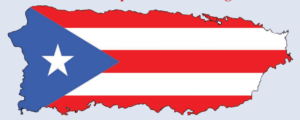
Puerto Rico’s status as a U.S. commonwealth, where residents enjoy U.S. citizenship and other benefits, has dominated the political life of the island for decades. In the latest twist of this status debate, a June 11 non-binding referendum was rigged by Gov. Ricardo Rosello and his ruling party to indicate prostatehood sentiment— even though less than one-in-four voters participated.
The opposition Popular Democratic Party— which prefers the island’s current status– fostered a successful voter boycott. “The referendum was rigged to support statehood because Rosello’s party initially sought to exclude the territorial option from the ballot,” ProEnglish Chairman Dr. Rosalie P. Porter charges. In any event, she says, “any legislative attempt by the island to become the 51st state must stipulate that English become its primary official language of the government, courts and school system. The island, after all, is predominantly Spanish-speaking.”
“Let’s remember that the 2011 recommendations from President Barack Obama’s Task Force on Puerto Rico’s Status says that, if the U.S. commonwealth ever applies for statehood, Congress has ultimate authority over admission and English must play a central role in the daily life of the island,” Porter says. “At a minimum, we believe a large majority must become fluent in English for statehood to be even considered.”
Porter warns that Rossello “will now push his own admission scheme– a Tennessee-style strategy to force Congress into statehood admission.” This refers to Tennessee’s territorial governor who — after convening a constitutional convention wherein delegates “converted” the territory into a state— applied for admission by sending “elected” senators and representatives to stand and lobby in the hallways of Congress demanding their seats. “Congress caved and admitted Tennessee. This must not be allowed to happen regarding Puerto Rico,” she says.
Spanish is the dominant language of the island, spoken by 95 percent of the population. Accepting Puerto Rico as a new state, without a specific designation of English as the primary official language of the island, would automatically transform the United States into a bilingual nation. In fact, ProEnglish believes Canada’s experience ought to remind us of the consequences. Accepting Quebec with its official French language made our northern neighbor bilingual– creating a sharp cultural and political divide, and adding high costs to government translation and other services.
Indeed, any congressional debate over statehood would be messy. The spotlight would shine on how expensive it would be for U.S. taxpayers to admit this poverty-ridden island to the union. In fact, Rosello’s open admission that he seeks statehood so mainland taxpayers can bail out the island from its financial and economic woe is certainly not the best argument for Congress to hear.
